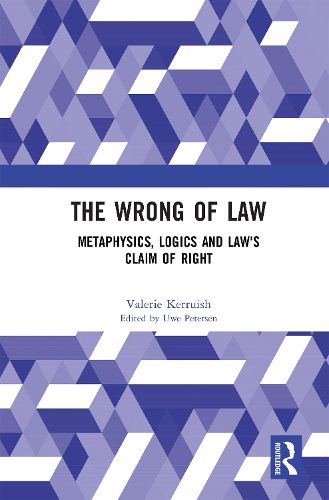Readings Newsletter
Become a Readings Member to make your shopping experience even easier.
Sign in or sign up for free!
You’re not far away from qualifying for FREE standard shipping within Australia
You’ve qualified for FREE standard shipping within Australia
The cart is loading…






This book combines metaphysics, aspects of modern logic, and legal theory in order to conceptualise a wrong in law's claim of right.
The book takes as its starting point a restriction on the freedom of concept formation that is dictated by classical logic's inability to handle antinomies in reason's attempts to constitute its own foundations. Relating this to law's claim of right, the notion of 'wrong' does not fasten on law's violence or injustice, and neither does it seek to elaborate a moral or ethical critique of law. On the contrary: it is sceptical of, and seeks an alternative to, the various ethical turns of recent legal and political theory. The 'wrong' of the wrong of law is logical and epistemic in character. It is a failure or refusal to recognise the cognitive relevance of contradictions of self-reference. In this respect, The Wrong of Law draws on a metaphysical-logical development from Kant via Hegel and Marx to the foundations of modern logic, in order to establish the sense in which a restriction on self-reference amounts to a limitation on truth-seeking or comprehension. This limitation is then demonstrated through analysis of the reasoning in a series of legal cases in Australia, concerning Indigenous peoples.
This book will be of significant interest to scholars in critical legal theory, the philosophy of law and jurisprudence; as well as others with an interest in foundational studies across the disciplinary borders of metaphysics, mathematical logic, sociology and legal theory.
$9.00 standard shipping within Australia
FREE standard shipping within Australia for orders over $100.00
Express & International shipping calculated at checkout
This book combines metaphysics, aspects of modern logic, and legal theory in order to conceptualise a wrong in law's claim of right.
The book takes as its starting point a restriction on the freedom of concept formation that is dictated by classical logic's inability to handle antinomies in reason's attempts to constitute its own foundations. Relating this to law's claim of right, the notion of 'wrong' does not fasten on law's violence or injustice, and neither does it seek to elaborate a moral or ethical critique of law. On the contrary: it is sceptical of, and seeks an alternative to, the various ethical turns of recent legal and political theory. The 'wrong' of the wrong of law is logical and epistemic in character. It is a failure or refusal to recognise the cognitive relevance of contradictions of self-reference. In this respect, The Wrong of Law draws on a metaphysical-logical development from Kant via Hegel and Marx to the foundations of modern logic, in order to establish the sense in which a restriction on self-reference amounts to a limitation on truth-seeking or comprehension. This limitation is then demonstrated through analysis of the reasoning in a series of legal cases in Australia, concerning Indigenous peoples.
This book will be of significant interest to scholars in critical legal theory, the philosophy of law and jurisprudence; as well as others with an interest in foundational studies across the disciplinary borders of metaphysics, mathematical logic, sociology and legal theory.